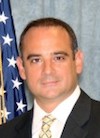Social Technologies in Emergency Management is a longterm research project that examines the use of social media by emergency management and response organizations that fall into one of five categories: fire departments, law enforcement agencies, emergency medical care providers, public health organizations, and executive emergency management departments.
RESEARCH TEAM
 Ines Mergel is the principle investigator of this project and Associate Professor of Public Administration and a Senior Research Associate in the Center for Technology and Information Policy. She serves as the research lead for the project “Social Media in Emergency Management”. Her research focuses on the adoption and diffusion of new technologies in the public sector. She has worked extensively on social media, open innovation, and open collaboration topics. Her book ‘Social Media in the Public Sector: A Guide to Participation, Collaboration, and Transparency in a Networked World‘ was published by Jossey-Bass/Wiley. Professor Mergel publishes her research in journals such as Government Information Quarterly, or Public Administration Review. A series of practitioner reports are published by IBM – The Center for the Business of Government. Ines Mergel is the principle investigator of this project and Associate Professor of Public Administration and a Senior Research Associate in the Center for Technology and Information Policy. She serves as the research lead for the project “Social Media in Emergency Management”. Her research focuses on the adoption and diffusion of new technologies in the public sector. She has worked extensively on social media, open innovation, and open collaboration topics. Her book ‘Social Media in the Public Sector: A Guide to Participation, Collaboration, and Transparency in a Networked World‘ was published by Jossey-Bass/Wiley. Professor Mergel publishes her research in journals such as Government Information Quarterly, or Public Administration Review. A series of practitioner reports are published by IBM – The Center for the Business of Government.
|
|
|
 Randall Griffin is an adjunct professor in the Maxwell School’s Department of Public Administration and a Professor in the Emergency and Disaster Management Executive Master’s Degree Program at Georgetown University. He has been a Training Officer, Health and Safety Officer, and Director of Medical Operations for the DeWitt, NY Fire District, for which he serves as Station Commander. He serves on several national boards, including the US Attorney General-sanctioned Inter Agency Board for Equipment Interoperability and Standardization. Randall Griffin is an adjunct professor in the Maxwell School’s Department of Public Administration and a Professor in the Emergency and Disaster Management Executive Master’s Degree Program at Georgetown University. He has been a Training Officer, Health and Safety Officer, and Director of Medical Operations for the DeWitt, NY Fire District, for which he serves as Station Commander. He serves on several national boards, including the US Attorney General-sanctioned Inter Agency Board for Equipment Interoperability and Standardization. |
|
|
 Margaret Hermann is Gerald B. and Daphna Cramer Professor of Global Affairs and Director of the Daniel Patrick Moynihan Institute of Global Affairs at SU’s Maxwell School of Citizenship and Public Affairs.Hermann’s research focuses on political leadership, foreign policy decision making, the comparative study of foreign policy, and crisis management. She has worked to develop techniques for assessing the leadership styles of heads of government at a distance and has such data on more than 300 leaders. She is currently involved in exploring the effects of different types of leaders and decision processes on the management of crises that cross border and boundaries as well as lead governments to experience crises. Her leadership style measures have also been applied to the leaders of transnational NGOs and international organizations.Hermann has been president of the International Society of Political Psychology and the International Studies Association and an editor of Political Psychology and the International Studies Review. She developed the Summer Institute in Political Psychology and was its director for nine years. Among Hermann’s books are Describing Foreign Policy Behavior; Political Psychology: Issues and Problems; and Leaders, Groups, and Coalitions: Understanding the People and Processes in Foreign Policymaking. Margaret Hermann is Gerald B. and Daphna Cramer Professor of Global Affairs and Director of the Daniel Patrick Moynihan Institute of Global Affairs at SU’s Maxwell School of Citizenship and Public Affairs.Hermann’s research focuses on political leadership, foreign policy decision making, the comparative study of foreign policy, and crisis management. She has worked to develop techniques for assessing the leadership styles of heads of government at a distance and has such data on more than 300 leaders. She is currently involved in exploring the effects of different types of leaders and decision processes on the management of crises that cross border and boundaries as well as lead governments to experience crises. Her leadership style measures have also been applied to the leaders of transnational NGOs and international organizations.Hermann has been president of the International Society of Political Psychology and the International Studies Association and an editor of Political Psychology and the International Studies Review. She developed the Summer Institute in Political Psychology and was its director for nine years. Among Hermann’s books are Describing Foreign Policy Behavior; Political Psychology: Issues and Problems; and Leaders, Groups, and Coalitions: Understanding the People and Processes in Foreign Policymaking. |
|
|
 Keli A. Perrin is the Managing Director of the Syracuse University Institute for Security Policy and Law and is an adjunct professor in the Maxwell School of Citizenship and Public Affairs. Her research focuses on topics related to homeland security, national security, emergency management, and privacy law. Keli A. Perrin is the Managing Director of the Syracuse University Institute for Security Policy and Law and is an adjunct professor in the Maxwell School of Citizenship and Public Affairs. Her research focuses on topics related to homeland security, national security, emergency management, and privacy law. |
|
|
 Joseph Hernon received his B.S. in Criminal Justice and Homeland Security, specializing in Emergency Management. He currently works for the State of New York Division of Military and Naval Affairs/J3-Domestic Operations as a Citizen Preparedness Trainer and as Emergency Management Coordinator for the Village of Fayetteville. Joseph Hernon received his B.S. in Criminal Justice and Homeland Security, specializing in Emergency Management. He currently works for the State of New York Division of Military and Naval Affairs/J3-Domestic Operations as a Citizen Preparedness Trainer and as Emergency Management Coordinator for the Village of Fayetteville. |
|
|
 Clayton Wukich is an assistant professor in the Department of Political Science at Sam Houston State University. He teaches courses on public management, organizational theory, public policy, and state and local government, among others. His research focuses on the role of information and communication technology in facilitating situational awareness and interagency collaboration during extreme events. He is currently a co-principal investigator for a National Science Foundation RAPID grant studying risk communication during the 2013 Colorado flood. Clayton Wukich is an assistant professor in the Department of Political Science at Sam Houston State University. He teaches courses on public management, organizational theory, public policy, and state and local government, among others. His research focuses on the role of information and communication technology in facilitating situational awareness and interagency collaboration during extreme events. He is currently a co-principal investigator for a National Science Foundation RAPID grant studying risk communication during the 2013 Colorado flood. |


